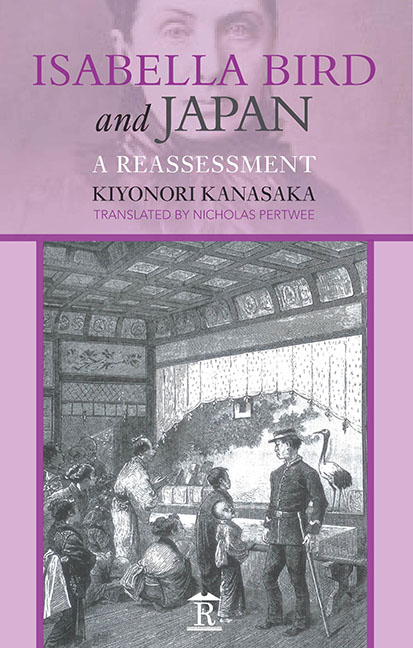Book contents
- Frontmatter
- Dedication
- Contents
- Foreword
- Author’s Preface to the English Edition
- Translator’s Preface
- Preface to the Japanese Edition
- Maps of Isabella Bird’s Travels in Japan (Figs 1–3)
- Chapter 1 Interpreting Bird’s Travels and Unbeaten Tracks in Japan
- Chapter 2 Isabella Bird – A Life of Travel
- Chapter 3 Aspects of Bird’s 1878 Visit to Japan
- Chapter 4 Access and Support in Japan
- Chapter 5 The Legacy of Bird’s Stay in Japan
- Endnotes
- Postscript to the Japanese Edition
- Chronology: The Life of Isabella Bird
- Bibliographies
- Index
Translator’s Preface
Published online by Cambridge University Press: 06 May 2022
- Frontmatter
- Dedication
- Contents
- Foreword
- Author’s Preface to the English Edition
- Translator’s Preface
- Preface to the Japanese Edition
- Maps of Isabella Bird’s Travels in Japan (Figs 1–3)
- Chapter 1 Interpreting Bird’s Travels and Unbeaten Tracks in Japan
- Chapter 2 Isabella Bird – A Life of Travel
- Chapter 3 Aspects of Bird’s 1878 Visit to Japan
- Chapter 4 Access and Support in Japan
- Chapter 5 The Legacy of Bird’s Stay in Japan
- Endnotes
- Postscript to the Japanese Edition
- Chronology: The Life of Isabella Bird
- Bibliographies
- Index
Summary
IT WAS QUITE by chance that I came across Renaissance Books and its publisher Paul Norbury. This was at the launch in October 2014 at the Daiwa Foundation's premises near Regent's Park of another of Renaissance's publications, Across the Three Pagodas Pass, which is a translation of the memoirs of Futamatsu Yoshihiko, a Japanese Army engineer who worked on the Thai-Burma Railway, edited by Peter N. Davies, Emeritus Professor of Economic History at Liverpool University. This provides probably the only account in English of work on the line as seen through Japanese eyes. There is no need to dwell here on what we all know happened on that railway. My reason for attending this event and my interest in the railway derive from an intention, not yet fulfilled due to lack of the necessary documents, to research the Japanese-built locomotives used on the line and to study the line's infrastructure. But that is all another story. Suffice it to say that that is how my relationship with Renaissance began, and my introduction to Kiyonori Kanasaka's study of Isabella Bird, which has assumed the form of Isabella Bird and Japan: A Reassessment, came about.
Professor Kanasaka is known in Japan as the foremost researcher of Bird's life and he has been especially praised for his impressive four-volume complete translation of Bird's Unbeaten Tracks in Japan. Bird's book was first published in two volumes by John Murray in October 1880 and tells of her six months in Japan in 1878. It became a best-seller in England and went through a number of reprintings and revised editions, and also attracted wide attention in the United States. Besides translating the entire contents of the two volumes, a major undertaking in itself, Kanasaka added numerous explanatory footnotes, a combination that makes this probably the definitive work of its kind. Laudatory comment on his work came from many sources in Japan, the most complimentary of which was probably that by Professor Tomiyama Takao, a distinguished scholar of English, and particularly Victorian, literature. Writing in the Mainichi Shinbun on 23 December 2012 of the first three volumes of Kanasaka's work, he described the footnotes as ‘superb’ and commented that the book as a whole would rank as ‘a masterpiece in the annals of Japanese translation’.
- Type
- Chapter
- Information
- Isabella Bird and JapanA Reassessment, pp. xix - xxvPublisher: Amsterdam University PressPrint publication year: 2017



